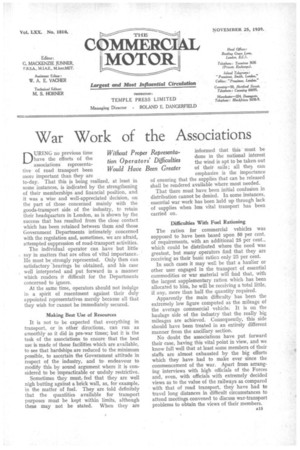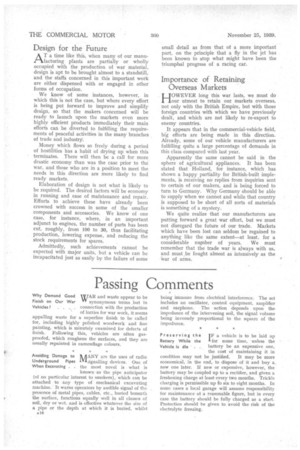War Work of the Associations
Page 17

Page 18

If you've noticed an error in this article please click here to report it so we can fix it.
DURING no previous time have the efforts of the associations representative of road transport been more important than they are to-day. That this is being realized, at least in some instances, is indicated by the strengthening of their memberships and financial position, and it was a wise and well-appreciated decision, on the part of those concerned mainly with the goods-transport side . of the industry, to retain their headquarters in London, as is shown by the success that has resulted from the close contact which has been retained between them and those Government Departments intimately concerned with the regulation and, sometimes, we are afraid, attempted suppression of road-transport activities. The individual operator can have but little say in matters that are often of vital importance. He must be strongly represented. Only then can satisfactory hearings be obtained, and his case well interpreted and put forward in a manner which renders it difficult for the Departments concerned to ignore.
At the same time, operators should not indulge in a spirit of resentment against their duly appointed representatives merely because all that they wish for cannot be immediately secured.
Making Best Use of Resources It is not to be expected that everything in transport, or in other directions, can run as smoothly as it did in pre-war times; but it is the task of the associations to ensure that the best use is made of those facilities which are available, to see that hardships are reduced to the minimum possible, to ascertain the Government attitude in respect of the industry, and to endeavour to modify this by sound argument where it is considered to be impracticable or unduly restrictive. Sometimes they must feel that they are well nigh butting against a brick wall, as, for example, in the matter of fuel. They are told definitely that the quantities available for transport purposes must be kept within limits, although these may not be stated. When they are informed that this must be done in the national interest the wind is apt to be taken out of their sails ; all they can emphasize is the importance of ensuring that the supplies that can be released shall be rendered available where most needed.
That there must have been initial confusion in distribution cannot be denied. In some instances, essential war work has been held up through lack of supplies when less vital transport has been carried on.
Difficulties With Fuel Rationing The ration for commercial vehicles was supposed to have been based upon 50 per cent. of requirements, with an additional 25 per cent., which could be distributed where the need was greatest, but many operators find that they are receiving as their basic ration only 25 per cent. In such cases it may well be that a haulier or other user engaged in the transport of essential commodities or war material will find that, with the largest supplementary ration which has been allocated to him, he will be receiving a total little, if any, more than half the quantity required.
Apparently the main difficulty has been the extremely low figure computed as the mileage of the average commercial vehicle. It is on the haulage side of the industry that the really big mileages are achieved. Consequently, this side should have been treated in an entirely different manner from the ancillary section.
No doubt the associations have put forward their case, having this vital point in view, and we know full well that at least some members of their staffs are almost exhausted by the big efforts which they have had to make ever since the commencement of the war. Apart from arranging interviews with high officials of the Forces and, even, with officials with extremely decided views as to the value of the railways as compared with that of road transport, they have had to travel long distances in difficult circumstances to attend meetings convened to discuss war-transport problems to obtain the views of their members. Design for the Future AA T a time like this, when many of our mann.*..facturing plants are partially or wholly occupied with the production of war material, design is apt to be brought almost to a standstill, and the staffs concerned in this important work are either dispensed with or engaged in other forms of occupation. We know of some instances, however, in which this is not the case, but where every effort is being put forward to improve and simplify design, so that the makers concerned will be ready to launch upon the markets even more highly efficient products immediately their main efforts can be diverted to fulfilling the requirements of peaceful activities in the many branches of trade and industry. Money which flows so freely during a period of hostilities has a habit of drying up when this terminates. There will then be a call for more drastic economy than was the case prior to the war, and those who are in a position to meet the needs in this direction are more likely to find ready markets. Elaboration of design is not what is likely to be required. The desired factors will be economy in running and ease of maintenance and repair. Efforts to achieve these have already been crowned with success in some of the smaller components and accessories. We know of one case, for instance, where, in an important adjunct to engines, the number of parts has been cut, roughly, from 100 to 30, thus facilitating production, lowering expense, and reducing the stock requirements for spares. Admittedly, such achievements cannot be expected with major units, but a vehicle can be incapacitated just as easily by the failure of some small detail as from that of a more important part, on the principle that a fly in the jet has been known to stop what might have been the triumphal progress of a racing car.
Importance of Retaining Overseas Markets HOWEVER long this war lasts, we must do our utmost to retain Our markets overseas, not only with the British Empire, but with those foreign countries with which we have previously dealt, and which are not likely to re-export to enemy countries. It appears that in the commercial-vehicle field, big efforts are being made in this direction. Already, some of our vehicle manufacturers are fulfilling quite a large percentage of demands in this class compared with last year. Apparently the same cannot be said in the sphere of agricultural appliances. It has been stated that Holland, for instance, which has shown a happy partiality for British-built implements, is receiving no replies from inquiries sent to certain of our makers, and is being forced to turn to Germany. Why Germany should be able to supply when we cannot and while that country is supposed to be short of all sorts of materials is something of a mystery. We quite realize that our manufacturers are putting forward a great war effort, but we must not disregard the future of our trade. Markets which have been lost can seldom be regained to anything like the same extent—at least, for a considerable number of years. We must remember that the trade war is always with us, and must be fought almost as intensively as the War of arms.






























































